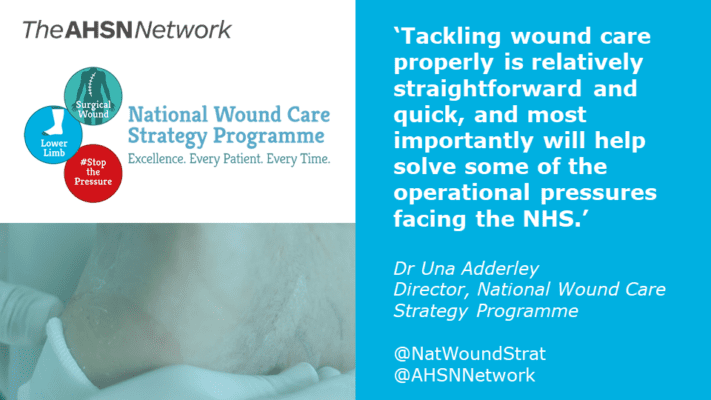Over the past two years, wound care has had to take a back seat to Covid, like many other services. However, wound care forms the largest proportion of community nursing work and continues to grow due to unwarranted variation. Tackling wound care properly is relatively straightforward and quick, and most importantly will help solve the operational pressures facing the NHS. But we have to ask, who is listening?
At the National Wound Care Strategy Programme, we’ve heard how the NHS has struggled to prioritise wound care because of the pressures caused by COVID-19. Delivering an effective wound care plan is relatively simple, and has the potential to make a huge difference to staffing numbers and resources.
There are many patients in community services needing care, and many more stuck at home or struggling to walk with lower limb ulcers. With a dedicated wound care service which can work through these patients swiftly in order to get them healing faster, you create more capacity in your community nursing service. This in turn also helps acute services by enabling swifter patient discharges and preventing unnecessary admissions, which also benefits ambulance services.
The National Wound Care Strategy Programme (NWCSP) began in 2018 and is focused on improving care for people with lower limb wounds, pressure ulcers and surgical wounds. All evidence points to huge variations in UK wound care services, which coupled with the underuse of evidence-based practices and overuse of ineffective practices, has left many patients receiving inadequate care.
The programme has developed recommendations which support excellence in preventing, assessing, and treating people with wounds to optimise healing and minimise the burden of wounds for patients, carers and health and care providers.
This offers major opportunities to improve the quality of chronic wound care through innovative solutions that will improve wound healing, prevent harm, increase the productivity of staff, and produce financial savings in line with the requirements of the NHS Long Term Plan.
In particular, establishing dedicated services for people with leg and foot ulcers will not take a huge number of staff, but will save a huge amount of time in community nursing and general practice. Putting more resources now into wound care treatment may seem counter-intuitive while resources are stretched, but the current arrangements are resulting in higher treatment costs and longer delays for patients.
The NWCSP, working with seven regional clinical sites, is already seeing impressive results from implementation of its recommendations. The Academic Health Science Network has now adopted this work as one of its new national programmes, and will be supporting other sites across England to implement these recommendations to achieve much better results.
NHS provider organisations or community interest companies who are not a NWCSP first-tranche implementation site (FImpS), but who are working actively across systems to improve lower limb care, are welcome to apply to join the NWCSP Lower Limb Forum. This forum gives early access to information about implementing the recommendations, and offers the opportunity to network and share learning with others seeking to improve lower limb care.
Improving clinical pathways, coupled with better data collection to ensure sustainability, will relieve stretched and overloaded NHS teams, as well as delivering the consistent care that lower limb wound patients need.
Find out more about the NWCSP Lower Limb Forum and apply to join.

“Health equity is the attainment of the highest level of health for ALL people. Achieving health equity requires valuing everyone equally with focused and ongoing societal efforts to address avoidable inequalities, historical and contemporary injustices, and social determinants of health — and to eliminate disparities in health and health care.” (health.gov) Within the NHS there [...]

Sickle cell disease (SCD) is a serious and lifelong health condition. People with SCD produce unusually shaped red blood cells that can cause problems because they do not live as long as healthy blood cells and can block blood vessels. This can result in suffers experiencing painful episodes, called sickle cell crises, as well as anaemia, [...]

At the Royal Society of Medicine’s Tackling Inequalities conference it was clear from the passion in the room that great progress has been made across the system to better support some of our most under-served communities. To maintain this momentum, we must not just embed tackling health and healthcare inequalities in all that we do, [...]







